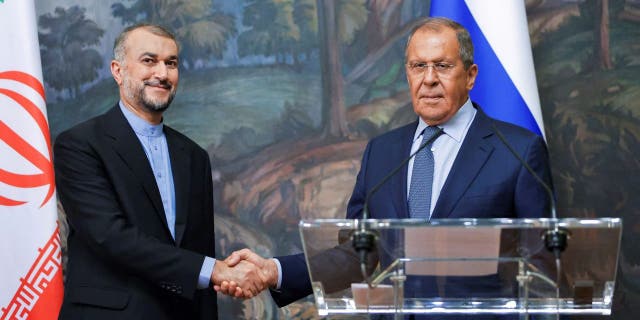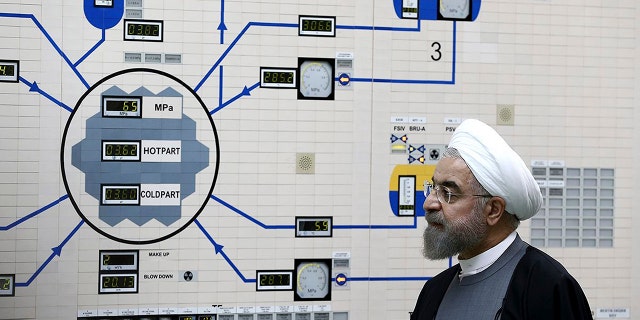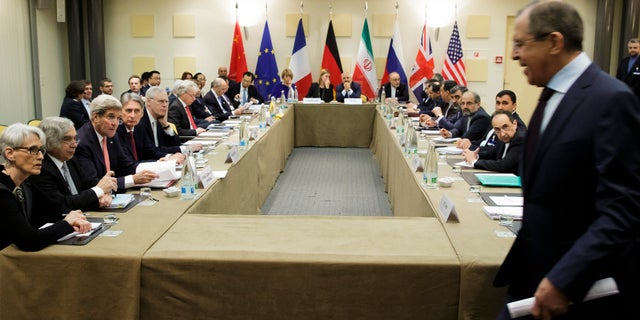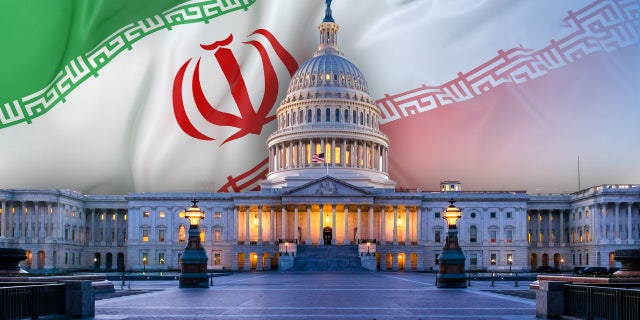Russia's Lavrov claims 'irreversible' arms race with Iran if nuclear deal not reached
Army vet says Russia is trying to 'freeze out' Ukrainians: It's 'cruel, barbaric'
U.S. veterans Staff Sgt. David Bellavia, Dr. Richard Jadick, and Ozzie Martinez Jr. weigh in on the intensifying war in Ukraine after Russia fired more than 100 missiles. They also reflect on the military's efforts in the Battle of Fallujah.
Russian Foreign Minister Sergei Lavrov on Thursday claimed that Moscow supports the U.S. and its Western allies in finding a nuclear deal with Iran and warned against the threat of an "irreversible" arms race.
"The JCPOA [Joint Comprehensive Plan of Action] has no reasonable alternative," he said in an interview with state owned media outlet RIA. "We consider it irresponsible to speculate about the notorious 'Plan B' and other unacceptable options."
Lavrov claimed not securing a deal would lead "to escalation, an arms race, an open conflict with irreversible consequences."
Though Russia played a critical role in attempting to revive a version of the 2015 Joint Comprehensive Plan of Action, also known as the Iran nuclear deal, Moscow’s relationship with Tehran has strengthened since it invaded Ukraine — making it an international "pariah" among Western nations.

Russian Foreign Minister Sergei Lavrov, right, and Iranian Foreign Minister Hossein Amir-Abdollahian shake hands during a joint news conference as part of their meeting in Moscow on Aug. 31, 2022.(MAXIM SHEMETOV/POOL/AFP via Getty Images)
Russia first threatened to block any progression in nuclear negotiations with Iran after the U.S. and Europe slapped stiff international sanctions on it following its deadly invasion.
But by mid-March, Moscow instead demanded guarantees from Washington that its trade with Iran would not be affected by the sanctions so that a nuclear deal could be reached.
The White House said the monthslong negotiations with Iran would not act as an "escape hatch" for Russia, though Lavrov claimed he received written guarantees from the U.S. that it would adhere to his demands.
"We of course would not sanction Russian participation in nuclear projects that are part of resuming full implementation of the JCPOA. We can't and we won't, and we have not provided assurances beyond that to Russia," State Department spokesperson Ned Price said.

Iranian President Hassan Rouhani visits the Bushehr nuclear power plant just outside of Bushehr, Iran, on Jan. 13, 2015. (AP Photo/Iranian Presidency Office, Mohammad Berno, File)
But despite Russia’s apparent support for the nuclear deal and more than a year's worth of dealings, negotiations stalled again by Septemberafter Iran in late August threw a wrench in the negotiations by demanding additional changes to a draft proposal.
The demands prompted Western officials to take a bleak look at the prospect of ever securing a deal with Iran, and a video that surfaced last weekappeared to show President Biden in early November proclaiming that the deal "is dead."
A State Department spokesperson told Fox News Digital this week that the "Iranians killed the opportunity for a swift return to mutual compliance with the JCPOA in September when they turned their backs on a deal that was on the table, approved by all."

Russian Foreign Minister Sergey Lavrov, right, arrives for a meeting with P5+1, European Union and Iranian officials during nuclear talks with Iran at the Beau Rivage Palace Hotel in Lausanne, Switzerland, on March 30, 2015. (Thomas Trutschel/Photothek via Getty Images)
"The JCPOA has not been on the agenda for months. It is not our focus," the spokesman added.
Lavrov blamed the stalled negotiations squarely on the U.S. and Europe and said their efforts "have sharply slowed down, switching to rocking the internal political situation in Iran."
The U.S., NATO and Kyiv have accused Iran of supplying Russia with Shahed drones, which have been used to strike civilian targets for months in Ukraine — though Moscow and Tehran claim that no such partnership exists.
"The Westerners started a fuss in the UN Security Council in connection with the alleged deliveries of Iranian 'drones' to Russia," Lavrov continued.
He claimed Washington and its allies have no proof and echoed repeated denials that Iran is providing Russia with drones to arm its deadly war in Ukraine.

President Biden has vowed never to allow Iran to acquire nuclear weapons. (iStock)
The White House contested these denials, and National Security Council strategic communications coordinator John Kirby in October told reporters, "There’s extensive proof of [Iranian drone] use by Russia against both military and civilian targets."
"Yet, both Iran and Russia continue to lie about it," he added. "They can lie to the world, but they certainly can’t hide the facts."






.jpeg)
Comments
Post a Comment